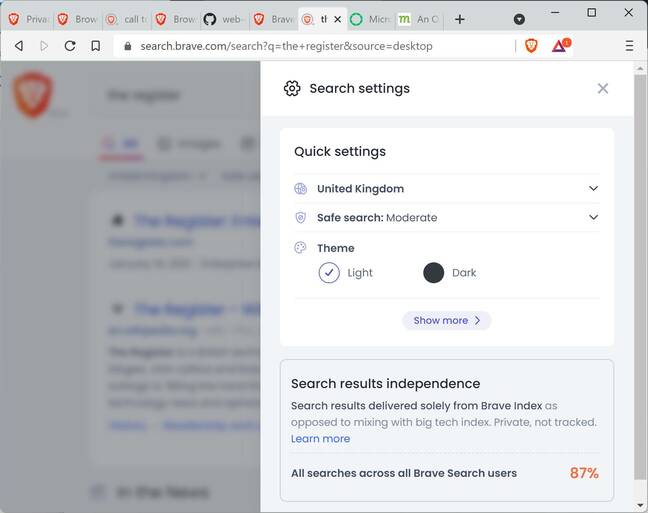This article is more than 1 year old
Brave's homegrown search claims to protect your privacy but there's a long way to go if it's to challenge the big G
Ad-free now but not forever
The Brave browser will now default to the company's own search engine, claimed to preserve privacy, while a new Web Discovery Project aims to collect search data again with privacy protection.
The Brave web browser is based on the Google-sponsored Chromium engine but with features designed to prevent tracking, as well as an unusual reward system using its own cryptocurrency, the Basic Attention Token (BAT). Brave search will now be the default on new installs for desktop, Android, and iOS. Existing Brave users will keep their current default unless they choose to change it.
Brave Search was released in beta in June and uses technology called Tailcat, acquired from the failed German Cliqz project, which also sought to provide a Google-free index.
The company said in June that "for some features, like searching for images, Brave Search will fetch results from Microsoft Bing," in line with the claim from Ecosia's founder, Christian Kroll, who told us earlier this month that the existence of Bing is "absolutely essential" to competing search providers.
A "search independence" metric shows the percentage of results delivered from Brave's index, and this is 87 per cent across all Brave search users at the time of writing. The company says it gets nearly 80 million queries per month. Google does that many queries in under four minutes, according to figures here.
The search is smart in this respect since at the foot of the results is an option to "find elsewhere", in our case offering Google, Bing or Mojeek (a UK-based independent search engine). Immediately conducting a further search is one of the indicators of poor search results that can optionally be recorded to improve the engine.
- Saving your battery as well as your privacy? New Brave for Android claims 5% power reduction
- From I'm feeling lucky to I'm feeling Brave: Browser maker erects web search engine beta
- Google's Privacy Budget doesn't add up, says Mozilla CTO - amazingly enough
- Alternative search providers write letter to EU complaining that Google antitrust action achieved diddly-squat
Brave search is currently ad-free, the bad news being that "the free version of Brave Search will soon be ad supported," according to a post yesterday. "Brave Search will also offer an ad-free Premium version in the near future," the company said, though as yet no further details are available.
Brave has also introduced the Web Discovery Project, a method of collecting user data (such as data on bad searches) while claiming to protect their privacy. "Brave needs data to power its privacy search," the project explains. The project aims to prevent linking records as belonging to the same person, to prevent profiling, "by strictly prohibiting any user identifier."
User data is still aggregated, but on the user's device, and when data is sent back to the Brave server, it omits any user identifier.
How good is Brave Search? Since many users are in the habit of using search for navigation, many searches are trivial, meaning "take me to Apple" or similar. A question like "How many states in the USA" is answered while typing on Google (as a "prediction"), where Brave search came up with a Wikipedia article in top position, requiring further clicks to get the information.
A developer query like "call to undefined function simplexml_load_file" successfully returns a Stack Overflow entry with helpful information. There are many kinds of searches, though, and our brief experiments show that Brave is way behind on depth and quality of organic results, but a pleasure to use in respect of freedom from ads – and although this is set to change, it may still be less confusing and ad-laden than a typical Google search result page.
Although in principle a new privacy-respecting search index will be welcome, there is a long way to go before it can make much general impact. Currently Google has a 92 per cent market share, according to Statcounter, with Bing in second place with 2.66 per cent. In web browsers, Google Chrome and Apple Safari account for around 84 per cent of the market, and both default to Google search. Brave's market share is somewhere in "Other", though the company reports over 13 million daily active users, more than double that of one year ago. ®

